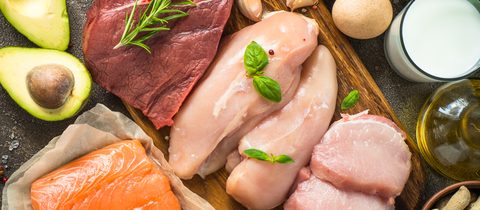What Happens to Your Cholesterol When You’re Powered By Fat?
In some people, low-carbohydrate and ketogenic diets increases LDL cholesterol
Low-carbohydrate and ketogenic diets show so much promise for the treatment of a wide range metabolic conditions, including obesity, diabetes, metabolic syndrome, neurological diseases and even mental health conditions. However, many doctors still discourage their patients from adopting ketogenic diets. Why? Because of the fear that ketogenic diets will increase LDL cholesterol, the so-called bad cholesterol that is associated with an increased risk of heart disease.
However, most people who adopt low-carbohydrate and ketogenic diets actually do not see an increase in LDL cholesterol. In fact, most people who adopt lower carb diets see improvements in a wide range of markers for cardiovascular risk, including an improvement in their LDL cholesterol profile. It would be very easy, in fact, to make an argument that low carbohydrate diets are good for heart health, especially for those with overweight, obesity, or diabetes.
Nevertheless, there are certainly some people who experience dramatic increases in cholesterol when they cut carbs. And, until recently, it’s been hard to predict who is most likely to see their LDL cholesterol spike when they go low-carb. The threat of a possible rise in LDL is almost like a scary cholesterol jack-in-the-box, discouraging doctors from supporting their patients trying a low-carb lifestyle for their health.
But now, new research is beginning to shed light on why LDL cholesterol sometimes increases on a low-carbohydrate diet, and the results are fascinating!
Lean Mass Hyper-Responders: Surprise! People who are lean, athletic and metabolically healthy may be most vulnerable for increased LDL cholesterol
In January of this year, a Harvard-based research team published a study on a group of 548 people who were eating low carbohydrate diets of less than 130 grams per day with the aim to identify the factors that most strongly associated with increases in cholesterol. Surprisingly, they found an inverse association between body mass index (BMI) and LDL cholesterol change on the low-carbohydrate diet. They also found an inverse association between triglyceride to HDL cholesterol ratio, a marker of good metabolic health, and LDL cholesterol change on the low-carbohydrate diet.
In other words, they found that people who were leaner and showed better metabolic health markers were the ones most likely to show increases in LDL cholesterol! The flip side of this coin is that, patients who want to use low-carb or ketogenic diets for the treatment of diabetes or obesity are probably less likely to see increases in LDL cholesterol, which should be a reassuring message for patients and their doctors.
The Lipid Energy Model could explain the dramatic increases in LDL cholesterol that can occur on a low-carbohydrate diet
The next big question is what’s causing LDL cholesterol to increase in some patients and not others? It’s certainly a perplexing puzzle, for the answer needs to account not only for the increase in total cholesterol and LDL cholesterol, but also for the inverse relationship between LDL cholesterol change on a low-carbohydrate diet and BMI and for the very high HDL cholesterol and low triglycerides seen in Lean Mass Hyper Responders.
But earlier this month, researchers published a on the “Lipid Energy Model” that could explain why leaner metabolically healthy people might see their LDL increase on low carbohydrate diets.
The premise of the model is that, on low carbohydrate diets the body becomes more dependent on fat as fuel. In leaner people, a change in hormones (including decreases in insulin and leptin), causes fatty acids released by fat cells to get taken up by the liver and packaged into particles called “VLDL” to carry fat fuel around the body. As the VLDL are broken down to supply energy to muscles and replenish emptying fat cells, the VLDL become LDL particles and components from the breakdown process are passed to HDL particles. This results in a metabolic profile of high LDL and high HDL cholesterol, along with low triglycerides.
If you want to learn more, you can check out a video abstract put together by the research team explaining the Lipid Energy Model here: https://youtu.be/AkzxESsTJyM
How can a Lean Mass Hyper Responder lower their LDL cholesterol?
While this is all very interesting, the clinical implications of the Lipid Energy Model are yet to be determined. In other words, it’s not clear whether the high LDL present in Lean Mass Hyper Responders is associated with increased risk of heart disease and, if so, to what degree?
Fortunately for these patients, lowering LDL can be as easy as cake… literally.
As the Lipid Energy Model predicts the increase in LDL is driven by being lean and eating a very low carb diet, adding back some carbs and increasing liver glycogen stores should be able to reverse the profile. And, in fact, in a clinical case series this was demonstrated. Lean Mass Hyper Responder patients were simply instructed to add 50 to 100 grams of carbs per day and all exhibited drops in LDL cholesterol of at least 100 mg/dl! One participant even saw his LDL drop from 665 mg/dl to 185 mg/dl by doing nothing more than eating a small, sweet potato’s worth of carbs per day!
What’s Next?
All this research is very new and, at present, the Lipid Energy Model is only a hypothesis. The next steps for scientists will be to rigorously test the model and figure out the nuances of how lipid energy metabolism is hormonally controlled in people eating low-carb diets. This research could reveal exciting discoveries, with implications for human health and disease.
References:
For more in-depth reading and viewing on this topic, check out the three papers and two videos. I will also be speaking with the researchers on my show in the near future, so stay tuned!
Lipid Energy Model: https://www.mdpi.com/2218-1989/12/5/460
Lipid Energy Model video abstract: https://youtu.be/AkzxESsTJyM
Lean Mass Hyper Responder study: https://academic.oup.com/cdn/article/6/1/nzab144/6446805
Lean Mass Hyper Responder video abstract: https://youtu.be/v4FXBtVXPhA
Lean Mass Hyper Responder Case report: https://www.frontiersin.org/articles/10.3389/fendo.2022.830325/full
Lean Mass Hyper Responder Case report





